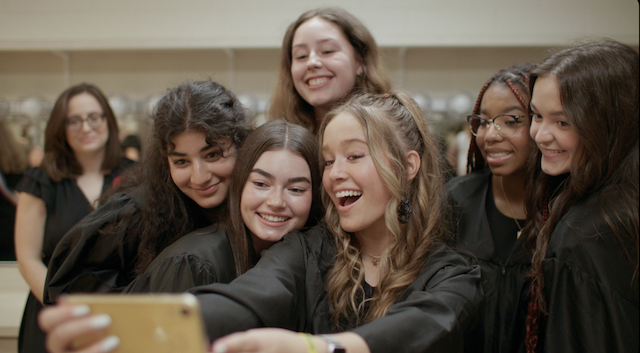
©Brooke Taylor and additional “Girls State” participants in “Girls State,” premiering April 5, 2024 on Apple TV+.
Girls State : A look at what American democracy would look like in the hands of teenage girls. Young female leaders from wildly different backgrounds navigate an immersive experiment to build a government from the ground up.
Genre: Documentary
Original Language: English
Director: Amanda McBaine, Jesse Moss
Producer: Amanda McBaine, Jesse Moss
Release Date (Theaters): Limited
Release Date (Streaming):
Runtime:
Distributor: Apple Original Films
Production Co: Apple Original Films, Mile End Films, Concordia Studio
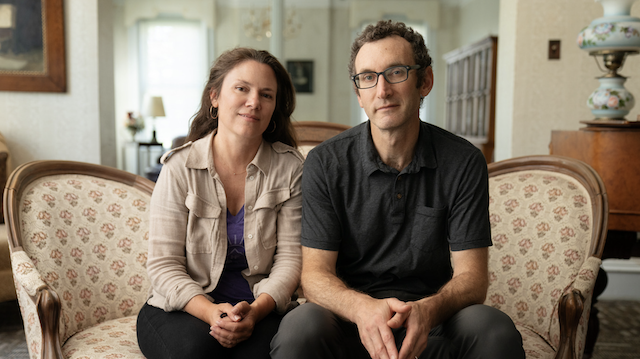
©Directors and producers Amanda McBaine and Jesse Moss behind-the-scenes of “Girls State,” premiering April 5, 2024 on Apple TV+.
Exclusive Interview with Directors Amanda McBaine, Jesse Moss
Q: You already decided to make a “Girls State” movie before even releasing Boys State. Obviously, because of equal opportunity and a different perspective, what were the key elements that you set out to capture before you went into the production?
Jesse Moss: When we started making “Girls State” in 2022, the country was in very different shape than it was when we made “Boys State” in 2018. The divisions that we’re interested in exploring in our country politically have only widened. We were curious how girls are feeling about the country, our future and whether they do politics differently than boys. We had explored that in “Boys State.” We’re also raising two teenage girls. We have two daughters, Amanda and I are married. We think a lot about girlhood now at this moment. We were intimidated to try to follow up “Boys State,” but we felt that it was really a necessary conversation, a continuation of the project to spend time with girls. And, of course, we were excited to see what would happen.
Q: I know that Bill Clinton and Dick Cheney attended the Boys State, are there women in Congress that attended the Girls State in the past?
Amanda McBaine: There are some notable Girls State alumni, in state governments. The most famous Girls State alum was in Texas, Governor Ann Richards. Some other notable people include Jane Pauley in the news media. I think very clearly there are a lot of very notable male Boys State alums.That’s partly because female representation is less in politics. And part of it is that, well, that’s a big part of it.
Q: It’s really engaging to listen to those girls talking about the abortion issue — Roe v. Wade. What conversations surprised you about their viewpoints and perspectives, especially when it came to the matter of abortion ?
Jesse Moss: I’ll start. First and foremost, it was important to see girls having the conversation for themselves. These are often decisions that are decided for them by men in state legislatures. Of course, the Supreme Court has more equal representation. But just taking ownership of the conversation, these are girls who will have to deal with this issue if they get pregnant so it’s not theoretical for them. I think that the space is interesting because it brings together people with different politics and asks them to talk to each other if they’re able to. That seems impossible in our adult politics. We are so polarized. These girls were really respectful of one another, open and willing to share their views.
There was some tentativeness at the beginning of the week of the program that they were feeling out what was OK to talk about and how they should talk about it. But partly because the program, the camp is like really limiting their independence in some ways. Slowly, through the week, they were given more opportunity to share those views.
What you see is that the boys were very tribal in their conflict. The girls were respectful and eager to share and were searching for common ground, or at least, respect and understanding. I don’t think they’re looking to seize political advantage by shouting from the rooftops or demonizing the other side. That was really interesting to see. For us to watch the Supreme Court at Girl State argue and decide a case around privacy, which is, of course, the legal issue around which the Roe decision was decided and then overturned. It couldn’t have been more important and momentous for us to see girls actually wrestle with the law as it relates to abortion.
Amanda McBaine: The girls decided that they’re going to just start talking about this stuff at the lunch table because that’s why they came to this program — to have this all-female conversation about an issue that they know people across the lunch table are going to have different views on. That was really important to them to engage in those conversations.
What I did see, which was a little bit reflected in how you see people voting in Kansas and Ohio, is that there are conservative kids who do not believe in abortion for themselves, but also don’t believe that the government should restrict another person’s right to that decision for themselves. That is a big group of voters, particularly female voters. So it’s interesting to see it actually play out in our 17-year-old girls in 2022 in Missouri. Once they got into that conversation, I think they were all very happy to be having the conversation amongst themselves.
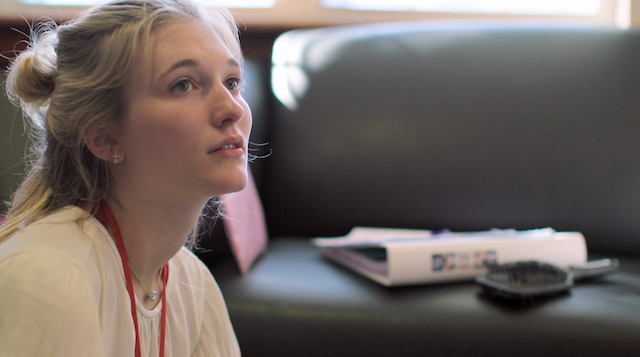 ©Emily Worthmore in “Girls State,” premiering April 5, 2024 on Apple TV+.
©Emily Worthmore in “Girls State,” premiering April 5, 2024 on Apple TV+.
Q: You have 500 girls attending this event. Obviously, you have to narrow it down to what [and who] to focus on. Some of them ended up on the cutting room floor. You decided whether you have to have consistency. You really have to make tough choices. Talk about the process of choosing a girl, what to select, what ended up on the cutting room floor.
Amanda McBaine: all the people who are featured in our film, we picked in months and months before the week of filming started. So that was a long process to figure out.
Q: You did interviews through the Zoom process, right?
Amanda McBaine: We zoomed with hundreds of kids then from there, chose a smaller group that we then filmed in Missouri. From there, we chose an even smaller group that we were going to actually follow through the week. There was a selection process before anything happened. What made it so was that we had no character, for instance, that we were following that went into the legislature.
A lot of what we filmed ended up on the cutting room floor because none of our main characters were there. Of the kids that we filmed, we shot way more than we were ever going to use. What makes it into the film versus not, is really a long, long process of cutting to the bone everything that really matters for the plot of the week, but more importantly, the emotions of the week.
For Emily, for instance, who’s really, in some ways, our main character, what are the moments of her journey from the beginning of the camp to the end, where she ends up at the end of the camp as a journalist investigating the disparities between the two programs and sort of her awakening to the very fact that these disparities do exist, even for bright, ambitious girls like her, conservative girls like her. That to me , was the process of the edit.
Q: Speaking of Emily, one of the most intriguing aspects of this film was that, after she lost the governor’s election, she pitched the idea to write an article about the comparison between “Girls State” and “Boys State.” What’s even more fascinating about this is that she came up with the title “Incomparable for Comparison,” which, in a way, sums up this movie, don’t you think?
Jesse Moss: A confirmation of what she was investigating was that they changed the title of her article. It reveals the hand of paternalism that women have had to fight and push against. It’s sort of an insult to injury that the article that lays out these disparities should itself be subject to the same disparities. I think it’s poignant to see that kind of disappointment on her face when she talks about both the pettiness and pain of having her article misleadingly titled, It’s a kind of a wonderful, powerful moment.
Emily’s story embodies so much of what we love about this journey of documentary filmmaking. She’s someone whose politics we don’t mostly share, but we really love and respect her. We’re asking our audience, who’s maybe predominantly progressive, to open their minds and hearts a little to share the journey of this young girl who’s very ambitious, but right of center in her political views.
I think, to take in her complexity, and then, to have your faith redeemed when she becomes the avatar of this investigation. It’s so important to call out these differences that really do limit opportunities for women, not just in the program, but in our society as a whole. I say this as a man, we know intellectually, conceptually, that these inequities, these barriers exist. But to have young women see them and call them out is, for me, just incredibly powerful. The film is not a lecture. It delivers its message in a gentle but forceful way. That’s possible. Gentle and forceful.
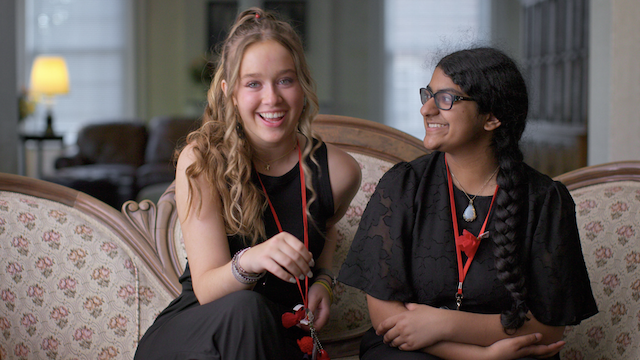 ©Brooke Taylor and Nisha Murali in “Girls State,” premiering April 5, 2024 on Apple TV+.
©Brooke Taylor and Nisha Murali in “Girls State,” premiering April 5, 2024 on Apple TV+.
Q: You have two teenage daughters. One of them is working on this project. Does showing much of her view help this production in a certain way? What are the views that you decide to apply into this film?
Amanda McBaine: Jesse likes to talk about the fact that we were pretty scared of making this movie, to follow up a movie that we felt very good about. We knew we had to make a girl movie.We couldn’t not make it because it was not a finished project without it. It’s terrible to make a movie that you know is going to be compared to some other movie. One of the ways we felt like we could do this was, we’ll make this film so that our 16-year-old daughter can work on it with us and see what we do.
if the film itself fails, at least we’ll have that life experience. And she will have seen what her parents do for a living and be part of that. That’ll be the joy of the Girl State project. Even though I do think this film succeeded more than we could have ever imagined, at least in terms of what we were trying for, it also succeeded in the sense that our daughter did get to witness what we do.
The family in the crew that’s built in making these films, the family that’s built in the connection with these powerful young women who are already doing amazing things in their lives, and making them part of our family, all the family building was amazing.Also, for her to see herself reflected in these girls in Missouri was also an aspect of her involvement. She grew up in California. She’s surrounded by very different politics for the most part than what she got to witness on the ground in Missouri. But to still see them be able to talk to each [was something else].
Maybe it’s also the philosophy of the program itself, which is to have human connection with people who are different from you, I think that was pretty striking for her as an experience. Even though she wasn’t in Girl State, the program, she was parallel to it and talking to a lot of kids who are very different from her politically. Jesse, do you want to add something?
Jesse Moss: I think that because we parent teenage girls, we bought a certain understanding of how we view the girls in this film as we built relationships with them, seeing them in all their complexities. To have faith in them, even when they might not take the path that we would script if we were screenwriters.
A certain amount of parenting is patience too. Filmmaking is patience and faith that things will work out. There’s parenting lessons. We have this incredible group of teenage girls who have invited us into their lives and we have made a partnership with them. It’s wonderful to not just see how they developed in the process of filming with them through this program, but to now give them a platform to raise their voice.
We think they’re teenage girls, but we need to hear their voices. They are imagining a new kind of politics for us. Our politics are broken in this country. How are we going to correct it? You tell me. I don’t have the answers. I don’t know that this film has all the answers, but it has one answer. It’s like, “Let’s look at a model of female leadership. We need more of it. We need a politics that has more empathy, more compassion, more openness, more something.” We fucked things up pretty badly here with Gen X and the Boomers.
These girls are not waiting. It’s true of the boys too. They’re not waiting for them to be given the reins. They’re leading political movements around climate change, gun violence, abortion politics and more. They’re not sitting on the sidelines waiting to be given political power. They know they have to take it. So let’s help them.
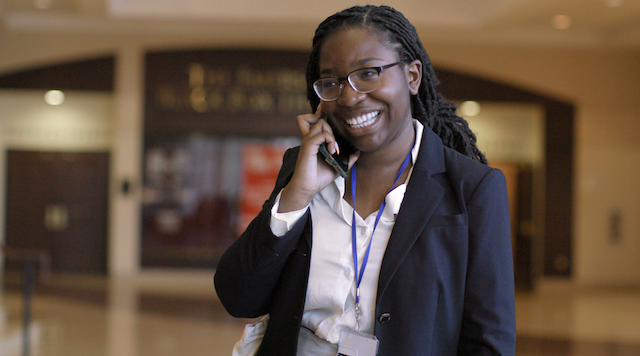
©Tochi Ihekona in “Girls State,” premiering April 5, 2024 on Apple TV+.
If you liked the article, please share your comment below!
Check out more of Nobuhiro’s articles.
Here’s the trailer of the film.

